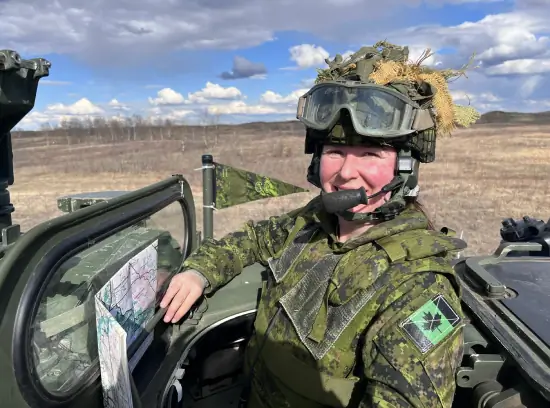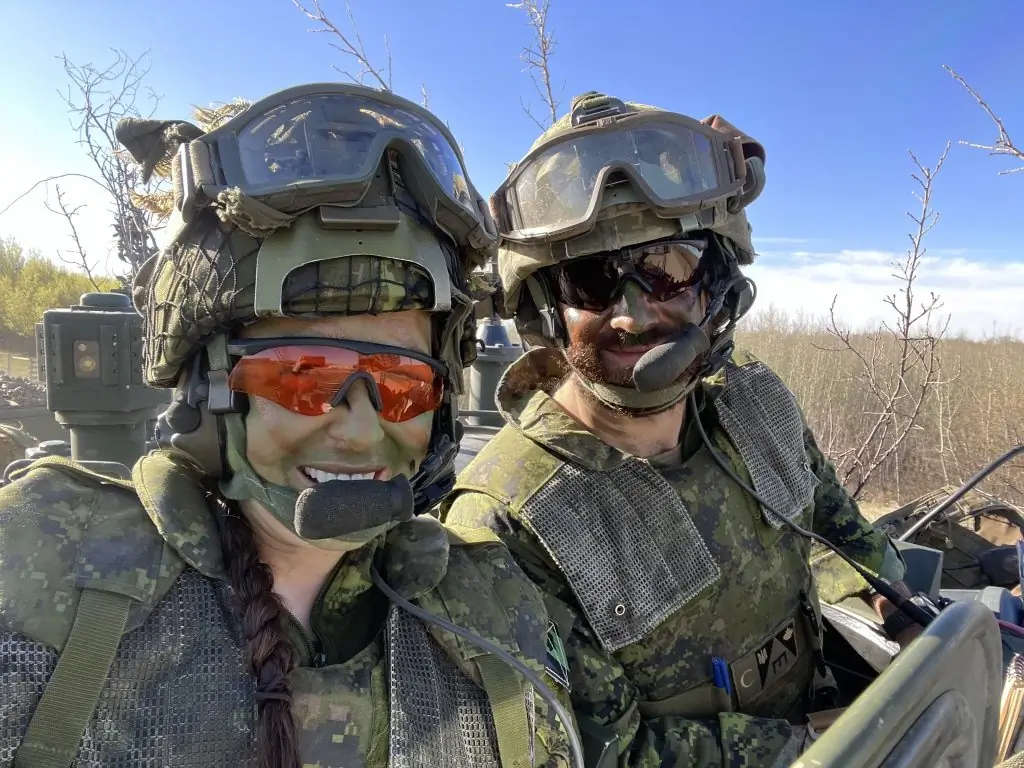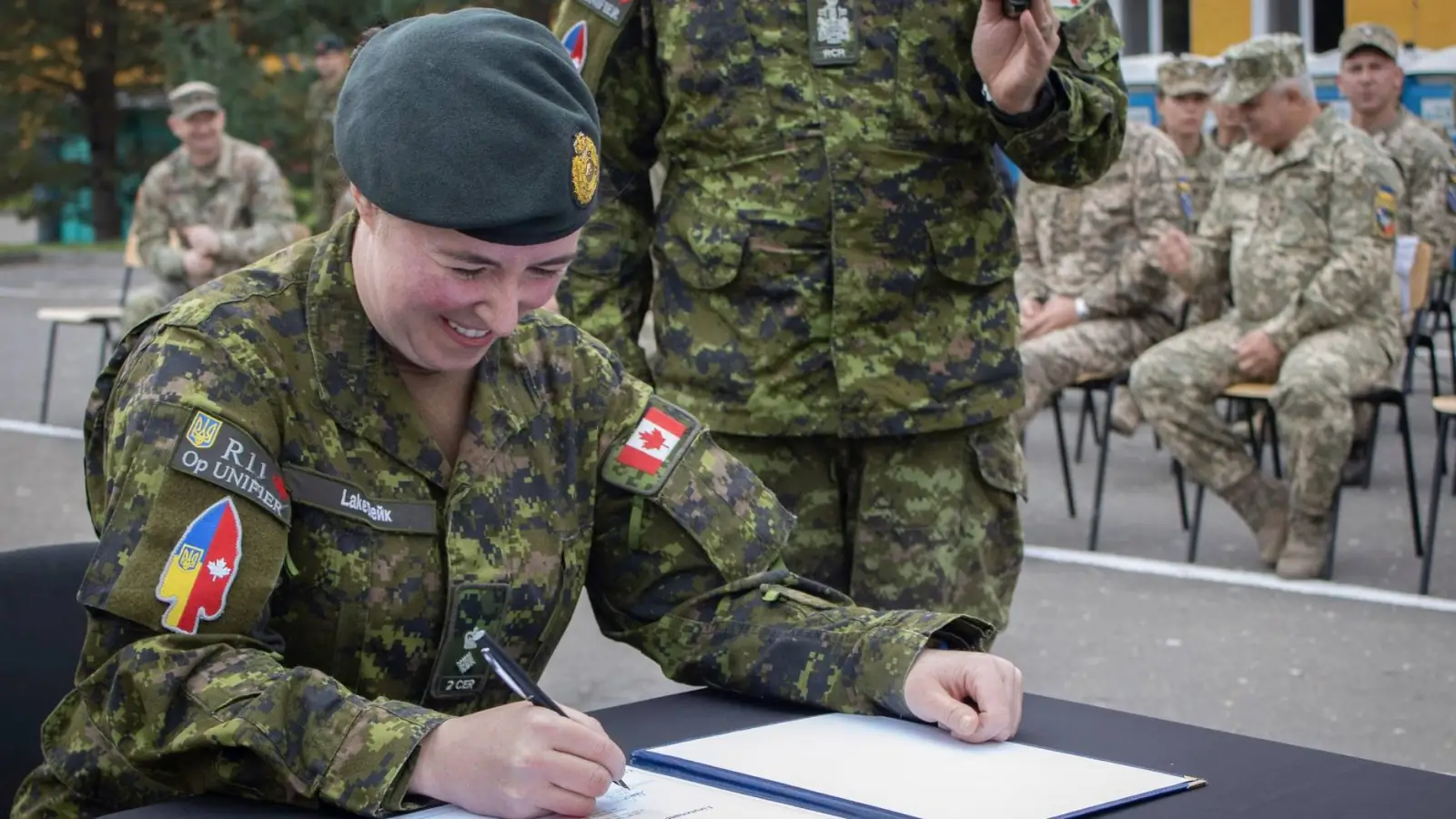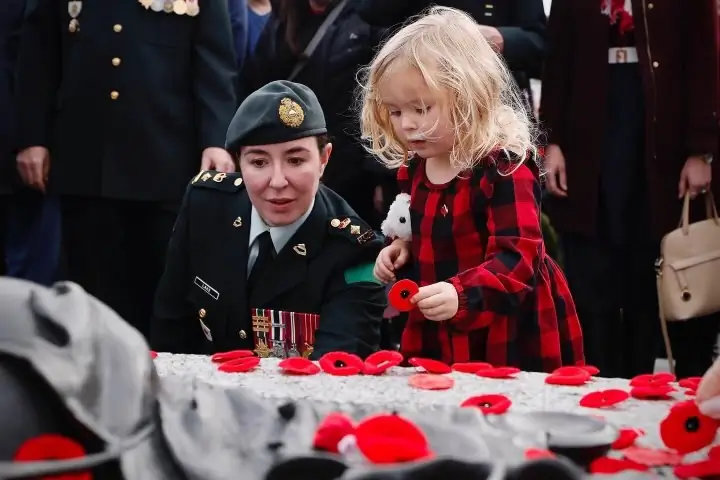
Early years & role models
The Honest Talk: Melanie, you grew up in Churchill Falls, Labrador. What was your childhood like?
Melanie: Growing up in Churchill Falls was quite a unique experience. It’s a small company town in the middle of the Labrador wilderness. And the nearest other community is about 260 km by dirt road, which we didn’t even get opened until I was in Grade 6. But it really made for a very tight-knit community. The outdoors was a huge part of our life. We had complete freedom. We played in the woods, and just really felt secure and safe.
The Honest Talk: Who were your role models growing up?
Melanie: I had a very inspiring, professional working mother. She was a teacher at our school, and just seeing the hours that she put into her work and balancing it all with taking care of us. She was certainly my first role model in terms of being a professional, being so dedicated, and caring so much about the people that you work with.
Decision to join the military
The Honest Talk: You ended up at the Royal Military College, which seems like a bit of a leap for somebody from Canada’s North and particularly at that time for a woman. How did that come to be?
Melanie: It was very much by chance. Growing up, I was a bit of an activist at an early age. I tried to spearhead a campaign to bring recycling to our community in Grade 6. I used to spend my babysitting money on sponsoring children through World Vision and spent a lot of time writing ministers, being really concerned about the environment. I would eat my breakfast watching BBC World News. I knew that I wanted to be involved in global issues, and I wanted to help people.
I loved sports and travel and challenges, but the military was a very unexpected choice. I learned about it quite late. When I decided to apply, it was very amusing to my teachers and the people who knew me because I was messy, unorganized, always late. I was about the farthest thing in the world from somebody who would join the military.
The Honest Talk: I can only imagine what your parents were thinking.
Melanie: It was certainly challenging for them. They were very supportive.
But when I was getting ready to head out the door for my first tour to Afghanistan, my mother was retiring from teaching, and she offered me her severance pay if I wouldn’t go.
Melanie Lake
I certainly understand her perspective a lot more now that I have my own daughter. I politely turned it down and thought it was amusing. But God, I really understand now.
The Honest Talk: Speaking of Afghanistan, you were at RMC on September 11. How did this experience change or impact your perspective on serving in the Canadian Armed Forces?
Melanie: That made it very real, very fast. I think for many people, the world changed that day. I remember I was walking to class and a peer in the hallway said, “Did you see about the planes crashing into the World Trade Center?” I went to our officer’s mess and just spent the whole day watching this with my peers. We all thought we were going to get called out to go down and join our colleagues at West Point in defending. Without a doubt that drove home what our role was, what our job was, what we might be asked to do.

The Honest Talk: Talk to us about why you stuck it out through basic training and then at RMC and why this ended up being the right career path for you.
Melanie: I’ve gone through many iterations in my career thinking that I was going to get out. But it was always the people that kept me in. I’ve loved the people that I’ve had a chance to work with and been so impressed by the plans that we could pull together when we all were working together and leveraging all our ideas.
I have really believed in the work over the years. And the opportunity to step out the door, to go to a foreign country, or even here in Canada with the Canadian flag on your sleeve, that’s an immense privilege. And it means a lot, knowing what you’re representing and what you have, the ability to contribute to that.
Melanie Lake
I think that there’s often a misconception about the military. I think a lot of people have thought, ‘I can’t be in the military. I don’t like to follow orders and listen to a lot of rules and direction.’ But that idea is really in contrast with how much authority and responsibility and trust we’re given.
For example, when I went to Ukraine, my closest boss was 8,000 km away, and I was empowered with a very broad decision-making authority with the ability to shape the mission, in accordance with what the needs were on the ground.
This idea of empowering your whole team, engaging the initiative, talent, and creativity of those teams to solve problems by telling them what you want to do, but not how you want to do it and letting people surprise you with their initiative. All those things, I think, have contributed to me staying much longer than I ever thought I would.
Melanie Lake about being Task Force Commander of Operation UNIFIER in Ukraine
The Honest Talk: Can we talk a little bit more about Ukraine, too? Because you played a key role in training the Ukrainian army prior to Russia’s invasion as the Task Force Commander of Operation UNIFIER in 2021. What was that like for you, especially knowing that conflict may be imminent?
Melanie: The threat became clear the minute we hit the ground. I had a very challenging first month in Ukraine. I arrived in March of 2021, right at the peak of the third wave of COVID. And Russia was building up on the border with Ukraine. I had about a week of handover with my colleague, Colonel Sarah Heer. We had the first woman-to-woman handover of commands on an operation. But we both got COVID during our handover week.
About two nights into my time, in the middle of the night our operational command called me to say that the assessment of the Russian buildup on the border had just changed to an imminent threat.
Melanie Lake
So it was just immensely complex, because we were a team of people made up from about 46 different units from all across the country, and most of our workup training had been virtual because of COVID.
And within 24 hours of hitting the ground in Ukraine, we were spread out to about 15 different locations around the country. We didn’t have a solid secure communication network. And we didn’t really know each other.
So we’re trying to deal with how do we respond to this threat? How do we make all these plans that we need to make? At the same time as our task force was dropping like flies with COVID. So, we were really managing two crises at once. But it was very clear to all of us from the start how real this threat was from Russia.

Melanie Lake about the Russian invasion of Ukraine
The Honest Talk: Melanie, what was your reaction in February 2022 when you learned that Russia had invaded Ukraine?
Melanie: The night of February 23, here in Canada, I was putting my daughter to bed. She had just fallen asleep. And I was scrolling on Twitter as I had been for weeks watching this. And I saw the airspace at Morrisville airport close and all the flights get turned around and thought, ‘Oh, my God, this is about to go.’ So I went downstairs and started watching.
It was just this mix of anger and disbelief that this was really going to happen in Europe in 2022 to people that I knew and cared about on ground that I had just walked. I found it so hard to reconcile.
Melanie Lake
Choices as a mother and a professional
The Honest Talk: Can I ask about what it was like for you on the personal front? You’ve described what it felt like as a professional being there and offering the training and then watching the invasion happen. But you also left your daughter back home in Canada, and she was quite young. Can you talk to us about what that experience was like for you?
Melanie: That was, without a doubt, the hardest thing I’ve ever had to do. I was on maternity leave when I got the call from our director to tell me that when I went back to work, I would end up having to mount a task force and deploy to Ukraine. They said if that’s going to be a problem you need to let me know now.
And I was looking at my daughter, who was five months old, and picturing the six-month deployment, like my god, I will be missing, like what equates to more than her entire life at this point, but taking over a unit, I had worked 20 years for that. It was my dream.
And I realized as well how important this mission was. So I told them I would be ready to go when the time came. But up until the night my partner dropped me off at the unit to leave, I had no idea how I was going to do it.
Colonel Sarah Heer knew what a hard time I was having thinking about this. She would send me copies of messages that her teenage daughters were sending her telling her how proud they were of everything she was doing.
And she told me stories about the young women in the Ukrainian military that she was meeting and how much it mattered to them seeing her there. So that certainly helped immensely. She told me, ‘I know your daughter is too young to send you these sorts of things, to say these things to you. But know one day she’ll be really proud.’
But the night I was driving to get dropped off, we left the house, and my daughter had woken up crying just before I left. So I basically had to peel her out of my arms and hand her over to my mother. And we started to drive to my unit and I said, “Turn around. I can’t go! Please just turn around. Take me back.” And my partner said to me, “You’re the Task Force Commander. I think you have to go.”

I just kept trying to think that the work was important, the work mattered, and maybe doing some of these things will help open up doors for her in the future or break down barriers that maybe she won’t have to fight against. But it was, without a doubt, the hardest thing I’ve ever had to do.
The Honest Talk: How does being a woman impact your career and your perspective on life?
Melanie: For me, in this role, it’s been both a challenge and an incredible asset. On the positive side in operations, I’ve seen how having a woman on the team has given us greater access to parts of the population that we wouldn’t have had access to otherwise and more diverse perspectives and decision-making, like relationship building.
And I really felt this on my last tour, that being there just in the position that you’re in, maybe you’re helping to open a future door for another woman behind you or changing a mind or breaking down a barrier.
Melanie Lake
But when it comes to the challenges, I mean, without a doubt, and I think this is women in any industry. There is increased scrutiny via what you wear, who you speak to, who you date, how you look, how you lead. And the more public your role, the more intense that scrutiny becomes. A
nd particularly when you get into the online environment it’s increasingly toxic, especially for women. And there’s this pressure that you feel when you’re in spaces without many women that the judgment that will be bestowed upon your entire gender kind of rests with your personal performance. The other really big challenge, I think that so many of us face is balance.
Frankly, it feels like a myth, the idea of work-life balance. We look around at each other and think that everybody has it so together. You’re not alone in this. Everybody feels like they’re a bit of a borderline disaster.
Melanie Lake
So many women feel like our resilience is just being stretched to the breaking point and that if one more thing happens, it’s all going to collapse. But I keep wondering: if we’re all feeling this way, are we the problem as individuals, or is there something in the system that’s just not working to enable this sort of balance that we desperately need?







